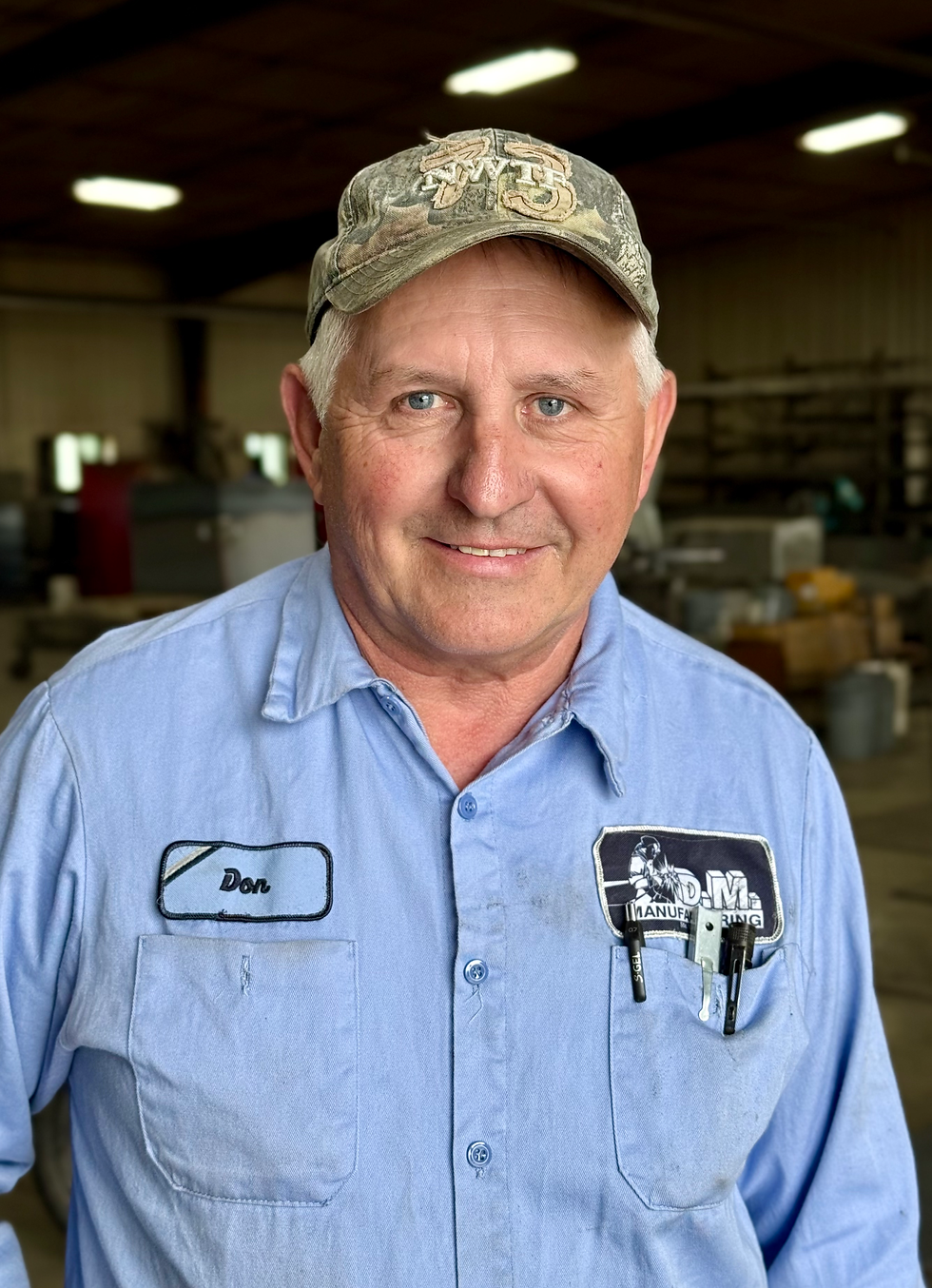Summer | 2025
Beneath the Hood, Behind the Helm
Don Geltz Didn’t Set Out to Build a Business—He Just Kept Making Things Better
“I’d say: learn all you can, work with your hands, and be kind. Because when you treat people right, they remember.” — Don Geltz

The smell of welded metal, the rhythmic clatter of grinders, and the low hum of machinery are background music to Don Geltz’s life—though he’d never describe it in such romantic terms. Don isn’t one to speak in metaphors. He’s too practical for that. But that doesn’t mean his story lacks poetry.
He grew up in the farmland folds near St. Marie, Illinois, surrounded by uncles who taught him the value of fixing what’s broken and helping neighbors when they’re in need. “I was always tinkering,” Don recalls. “On the farm, something always needed fixing. That’s where I caught the bug.”
By the time he was a student at Newton Community High School, Don already had a sense for what his hands could do. Welding came naturally. After graduation, he enrolled at Olney Central College for a two-year program, preparing to do what he loved—without ever imagining where it might take him.
He worked several welding jobs, learning the ropes at various shops, mostly manufacturing outfits. “The last place I worked, they made product,” he says. “That gave me ideas.” Farmers in the area started coming to him with suggestions: “Could you build this? Think you can make it better than what’s out there?” He listened.
In 1992, Don co-founded D & M Welding. By 2006, his partner had moved on, and Don took the reins completely. What began as a service shop evolved into a manufacturing enterprise with original designs—many of them informed by conversations over fence posts and truck beds. “We make commercial trash dumpsters, stainless steel hog feeders, and custom products for other companies,” Don explains. “A lot of it’s stuff we designed to improve what wasn’t working well for the farmers around here.”
Today, the shop employs thirteen people, some dedicated to welding and others to assembly and packaging. Their products are shipped across Illinois, Indiana, Missouri—sometimes by pallet, other times by full semi-load. Though Don speaks modestly of it, this is a real business with real reach, shaped by the simple premise that listening closely and working hard can still build something lasting.
He smiles when asked if he ever imagined owning a business of this scale. “No, I thought I’d just be welding,” he says, then adds with a shrug, “But I had good support.”
That support began with family. Today, it includes his wife and two daughters. One is a third-grade teacher, the other a substance abuse counselor. Both live nearby. “It’s good having them close,” he says. “Means a lot.”
While Don didn’t chase prestige or visibility, he values education deeply. “I think young people should go to college—even if it’s just one or two years,” he says. “Not just for the learning, but for learning to work with people who aren’t like you.”
He’s proud of the growing recognition for trades, even if he was “in trades before trades were cool,” as the paraphrased saying goes. Don’s shop has become a kind of informal continuation school for Newton graduates—especially those shaped by the revitalized welding program at the high school. “The Tarr boys, Brock and Travis, they’ve really turned that program around,” he says. “We’ve got guys here who came through that pipeline. Good workers.”
And when the time comes for Don to hang up his hood, he doesn’t want the shop’s story to end. “I’ve got a young guy who’s interested. I think I need to sit down with him, really lay it out. He’ll need a few years to learn it all. But I want to see it keep going.”
That future-mindedness is subtle but steady. Don’s not rushing for retirement, but he’s not ignoring it either. “I’ll probably stay till I’m 67 to get full benefits,” he says. “But I still enjoy coming in. I’ve got good guys, good work. What would I do at home all day?”
He goes camping sometimes, but laughs when asked if that could fill his weeks. “Only so much of that you can do,” he says.
When asked what advice he’d offer a younger version of himself, Don doesn’t hesitate. “Learn as much as you can—hands-on, especially. And be kind. Treat people the way you want to be treated.”
It’s a philosophy he’s lived. In a small town, that kind of character doesn’t go unnoticed. “You see folks at the store or the café, and you end up talking about work, about kids,” he says. “There’s comfort in that.”
Not that small-town life is perfect. “Sometimes people know too much about your business,” he jokes. “But when it matters—when somebody’s in trouble—people show up. That part, that’s priceless.”
Don’s story isn’t about chasing headlines. It’s about showing up, every day, for decades. It’s about solving problems when they arise, treating people fairly, and building something quietly exceptional in a place that values humility over hype.
And it’s about passing that torch—welded handle and all—to someone who sees the value in what’s been built.
